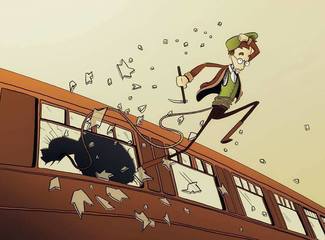 I love Boone Shepard. Of all my characters, he’s the one I most enjoy returning to because it always feels a little like coming home. Boone, unlike the vast majority of other protagonists I’ve written, is also a good person and an outright hero which, y’know, makes him a bit more palatable to revisit than some of the murderers, manipulators or worse who head up other stories. The other great thing about Boone is that his stories are almost endlessly flexible. He travels the world and occasionally through time in pursuit of adventure, and this means that any time I settle in to write a new Boone yarn I can go just about anywhere. There also an inherent tonal elasticity built into the fabric of the series; the first novel, after all, goes from a vastly improbable fight on a train to relentless jokes about manatees to an overall plot about oppression and human experimentation. American Adventure features a scene where Elvis Presley appears speaking only in quotes from Elvis songs, most of the third act takes place aboard a literal flying casino, but at its heart it’s about what being a good person really means. Boone Shepard, to me, is able to be both meaningful and absurd (and scarcely anything in between), and so it stands to reason that different stories about him will lean more towards either extreme. Boone’s adventures fall into a few categories. There are the three novels, which comprise the most consequential events and adventures in his life, there are the ongoing short stories, most of which take place in the months before the first novel and are, by and large, fun little jaunts. And as of yesterday there’s a new category that I’m not yet sure how to define. I’ve been careful not to be too specific with Boone’s backstory prior to the first novel. The reason for this is that I like having big gaps in his life in which anything could have happened; the only rock solid canon for him is what you see in the books. I’ve never, for example, stated what countries Boone has been to or which famous figures he’s met or what kind of monsters he’s been up against. This flexibility leaves so much territory to be explored and very few moments where anything can be contradicted. That said, I’ve got a reasonable grasp on the timelines and various key events of his life, but there is period I’ve never given that much focus; that period being the time right after Marbier died. For those who have read the first novel, it’s the time immediately following the extended flashback sequence in the middle of the book. There are a couple of reasons for this. One is that I like Boone’s short adventures to be fun, and two is that, as this was a period of confusion and pain for him, we would be dealing with a Boone Shepard who is not fully formed and potentially a little unstable. Dramatically fertile territory, sure, but not the kind of thing a kid can read and enjoy. But when a story comes it comes and the other day, listening to the song “Pilgrim (You Can’t Go Home)” by Dave Rawlings Machine, I had the beginnings of an idea, a melancholic tale about an aging gunslinger facing his last stand. It’s similar territory to Below Babylon, but that play never really worked on the level I wanted it to work, and furthermore I had much clearer ideas for this new one. And beyond even that, it took about five minutes from conception of the idea to realise that it was a Boone Shepard story. When I realised how dark it was going to go I toyed with swapping Boone for a new character, but the more it developed the more I realised only he made sense. The play, weirdly, isn’t about him; the main character is very much Emery Quinn, the gunslinger, but a Boone Shepard nearing the tail end of his darkest hour was the foil Emery’s story needed. And so I got to work and what I ended up with was something I’m not sure how to feel about. Boone Shepard and the Last Gunslinger is not a children’s story. I mean, there’s nothing overtly inappropriate in it, but it’s got a far bleaker tone than any of Boone’s other adventures and spends a lot of time exploring the kinds of themes that kids would probably find super dull. And that’s not even touching on where it takes Boone’s character, to a place that even I’m a little torn about. But those concerns kind of dissipate in the face of how much I enjoyed writing it, or how proud I am of it. Whether it gets produced and whether said production paves the way for more Boone stage shows, some of which go to similar dark places, remains to be seen. I personally think it fits the Booniverse, but anybody who mainly enjoys the swashbuckling adventure parts of Boone’s stories probably isn’t going to get much out of this particular tale. If nothing else it consolidates what I love about writing Boone Shepard; it’s hard to get bored of a character who in one story can muse on existentialism while trying to stop an old gunslinger committing one last murder, and in the next ride away from a gang of crossbow wielding skiers on the back of a moose.
0 Comments
Leave a Reply. |
BLOG
Writing words about writing words. Archives
May 2024
Categories |
 RSS Feed
RSS Feed
